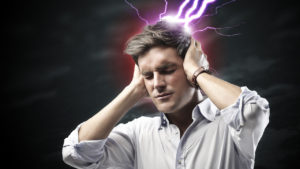

Only those who suffer from migraine know how painful it is. You can’t think, you can’t work, and you just can’t function. The only thing you feel like doing is pulling out all your hair in desperation, hoping that somehow that throbbing in your head would stop.
Migraines are severe, recurring, and painful headaches, usually one-sided and are often accompanied by nausea, vomiting, blurred vision and/or intolerance to light or sound. The paralyzing nature of migraines, often disrupt normal daily activities. They affect the quality of your life, your performance in school, work and personal life too.
What causes Migraine headache?
The exact cause of migraine is still a mystery, many possible theories are put forth but none are able to establish concrete basis of migraine causation.
There are multiple factors that can trigger Migraine in susceptible people:
1. Environmental: : These include aspects such as high temperatures, high level of humidity, high intensity light, varying weather conditions, etc
2. Lifestyle: Poor food practice like skipping meals, often fasting, overwhelming particular types of cheese, chocolates, food with Monosodium glutamate, or fermented foods, can cause Migraine.
3. Genetic: Research has proved that about 90% Migraine are due to genetics, that is, have a family member who is also a sufferer.
4. Nervous disorder: If a person is suffering from neurological disorder like Epilepsy or Alzheimer, then there is high chance of Migraine triggering.
5. Abnormality in brain: Abnormality of chemicals present in the brain, like serotonin, is a common phenomenon with the kind of lifestyle we head now. This can be another reason for triggering a Migraine.
6. Medications: Occasionally chemical composition of certain medications may not go well for some of the body nature.
7. Sensory stimuli: Migraine can sometimes be triggered with bright lights, too loud sounds; particular types of smells from perfumes, cigarettes or even paint can trigger off the pain.

Types of Migraine
There are two main types of migraine. This classification depends on whether the individual experiences or not, any warning signs in the form of disturbances of the senses leading up to a migraine. These are known as auras.
Migraine with aura
For many people with migraine, the auras act as a warning signs, telling them that a headache is soon to come. The effects of an aura can include:
- confusing thoughts or experiences
- the perception of strange, sparkling or flashing lights
- zig-zagging lines in the visual field
- blind spots or blank patches in the vision
- pins and needles in an arm or leg
- difficulty speaking
- stiffness in the shoulders, neck, or limbs
- unpleasant smells etc
Migraine without aura
More commonly, a person will experience a migraine without any sensory disturbance leading up to the attack. Around 70 and 90 % of migraines happen without an aura.
Other types
There are other types of migraine related to specific syndromes or triggers, including:
- Chronic migraine: This refers to any migraine that triggers attacks on over 15 days of the month.
- Menstrual migraine: This is when the attacks occur in a pattern connected to the menstrual cycle.
- Hemiplegic migraine: This causes weakness on one side of the body for a temporary period.
- Abdominal migraine: This is a syndrome that connects migraine attacks to irregular function in the gut and abdomen. It mainly occurs in children under 14 years of age,
- Migraine with brain stem aura: This is a rare type of migraine that can trigger severe neurological symptoms, such as affected speech.
Different phases of Migraine
Migraines have four distinct phases: Prodrome, Aura, Headache, Postdrome. Not everyone will experience a headache in these 4 phases and the duration and nature of each phase differs in every individual. The part most people are familiar with is the third phase, which is the most painful.
Symptoms of Migraine


- Moderate to severe pain, usually confined to one side of the head but capable of occurring on either side of the head
- Severe, throbbing, or pulsing pain
- Fatigue
- Dizziness
- Increasing pain during physical activity or when straining
- Inability to perform regular activities due to pain
- Feeling sick and physically vomiting
- Increased sensitivity to light and sound, relieved by lying quietly in a darkened room
Some people experience other symptoms such as sweating, temperature changes, stomach ache, and diarrhea.
The impact of migraine
People with chronic migraines report a lower quality of life. They often have sleep troubles, miss days at work and school because of headaches, land up backing out of social engagements often and tend to have lesser energy and zest than those who do not suffer from migraines. So large is the effect of chronic migraine on some people that they actually live in worry and fear of the next attack. They tend to curb their activities, eat cautiously or be on the edge in anticipation of a migraine attack.
It is almost like they are unable to live their life to the fullest. Their relationships also tend to suffer because of this ailment. Their partners, family members and friends often feel irritated or annoyed by this health problem. Stress and misunderstandings build-up in relationships when the other partner in unable to understand the severity of the ailment and it also affects the spontaneity in relationships. Occasionally, if the migraines are too severe, it can even push the person towards developing depression.
How to prevent Migraine?
The Migraine headache may last for about 4 hrs to 72 hrs. It is episodic and can get as recurrent as occurring every day.
- Identify the triggering factors and try to stay away from them.
- Try to keep your blood sugar levels normal. Have small meals throughout the day and avoid staying hungry for long duration of time.
- Stays hydrated and drink enough water throughout the day as dehydration can trigger Migraine.
- Get optimum sleep and try maintaining a sleep routine.
- Inculcate healthy eating habits such as consuming carbohydrate-rich, sumptuous breakfast daily, avoiding fermented foods, etc.
How to get rid of Migraine?


Homeopathy for Migraine
Homeopathy has proved very effective in the treatment of migraine headaches. A Patient will experience that the frequency and intensity of migraine headache decreases, those who are previously dependent on pain killers could manage without them. Regular follow ups and adherence to the directions have often resulted in complete cure of migraine with homeopathy treatment in our experience.
In homeopathy there are more than 200 medicines indicated for migraine headache, the selection of medicine in each individual patient depends on individualistic or unique symptoms. The homeopathy remedies are safe, gentle and are made from natural resources and can be given to people of all age groups – from infants to elderly.
Watch our video on Migraine- Migraine-how to get relief by Dr Tejaswi.


Dr. Tejaswi K.P.Reader- Dept. of Surgery
Bhagwan Buddha Homeo Medical college
Mallathalli Bangalore
Consultanat- Surabhi Homeo clinic, Vidyaranyapura, Bangalore-97
Mob-97311 33819 Email-drtejas2000@rediffmail.com











